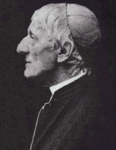Theo Hobson is writing a regular column for Coffee House on religion. This week he tackles the legacy of Cardinal Newman and the Alpha Movement’s new ad campaign.
 Frankly I don’t care whether or not Cardinal Newman’s remains are dug up and buried somewhere more saintly; the phrase ‘let the dead bury their own dead’ springs to mind. But it slightly amuses me that Peter Tatchell defends Newman’s right to be left where he is, next to the man whom he loved, Ambrose St John. On Newsnight,Tatchell was coy about what sort of love he thought was involved. He laughably described the friendship as a ‘same-sex’ relationship: it’s quite hard for two men to have a non-same-sex relationship.
Frankly I don’t care whether or not Cardinal Newman’s remains are dug up and buried somewhere more saintly; the phrase ‘let the dead bury their own dead’ springs to mind. But it slightly amuses me that Peter Tatchell defends Newman’s right to be left where he is, next to the man whom he loved, Ambrose St John. On Newsnight,Tatchell was coy about what sort of love he thought was involved. He laughably described the friendship as a ‘same-sex’ relationship: it’s quite hard for two men to have a non-same-sex relationship.
The story is an opportunity to reflect on the pernicious legacy of the most famous failed Anglican before Tony Blair. Newman’s influence on theology, and religious culture, in this country has been, to my mind, deeply regrettable. He gave intellectual respectability to the idea that ‘liberalism’ is the enemy of religion. Of course there had been anti-liberal trends in religion before this (Methodism, for example), but none had been so highbrow. His anti-liberalism led him to Rome, but it also infected the Church he left. Before Newman, Anglicans were proud of their liberalism; they saw the liberal state as a good thing. After him, Anglican theologians worried that liberal Protestantism was a sell-out, and agreed that the Church had to be a mini version of Roman Catholicism to have any claim to authenticity. Of course liberal Anglicanism carried on, but it was never quite confident of the intellectual or spiritual high-ground again. It’s now on its very last legs.
It’s hardly exaggerating to say that the triumph of conservatism over liberalism in the breast of Rowan Williams is down to Newman’s influence. (Largely thanks to Williams, Newman infects postmodern Anglican theology.) More widely, it’s largely thanks to him that our religious culture is dominated by a sterile opposition between the churches and ‘secular liberalism’. He tied Christianity to nostalgia for the pre-modern world harming its ability to renew itself in the context of political modernity. May he rest in peace, or not.
***
I am not generally a fan of the Alpha movement (the neo-Methodist movement of today). Their publicity usually depresses me. A few years ago they kept displaying a cartoon man being squashed by a sausage-shaped question-mark, alongside facile slogans like ‘Wanna know what The Meaning of Life is?’. At one point there was a photo of a toothy blonde with a conspicuous engagement ring (‘get it here’). But their latest advertising slogan is inspired. ‘If God did exist, what would you ask him?’ It nudges the agnostic into a moment of empathy with the religious worldview. At the risk of sounding overly highbrow, there is an echo here of Wittgenstein’s idea that religion should not be seen as either ‘true’ or ‘false’ but as a distinctive way of seeing the world.







Comments